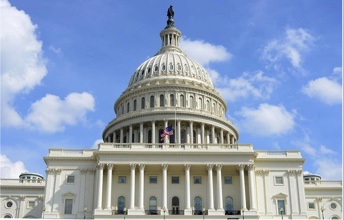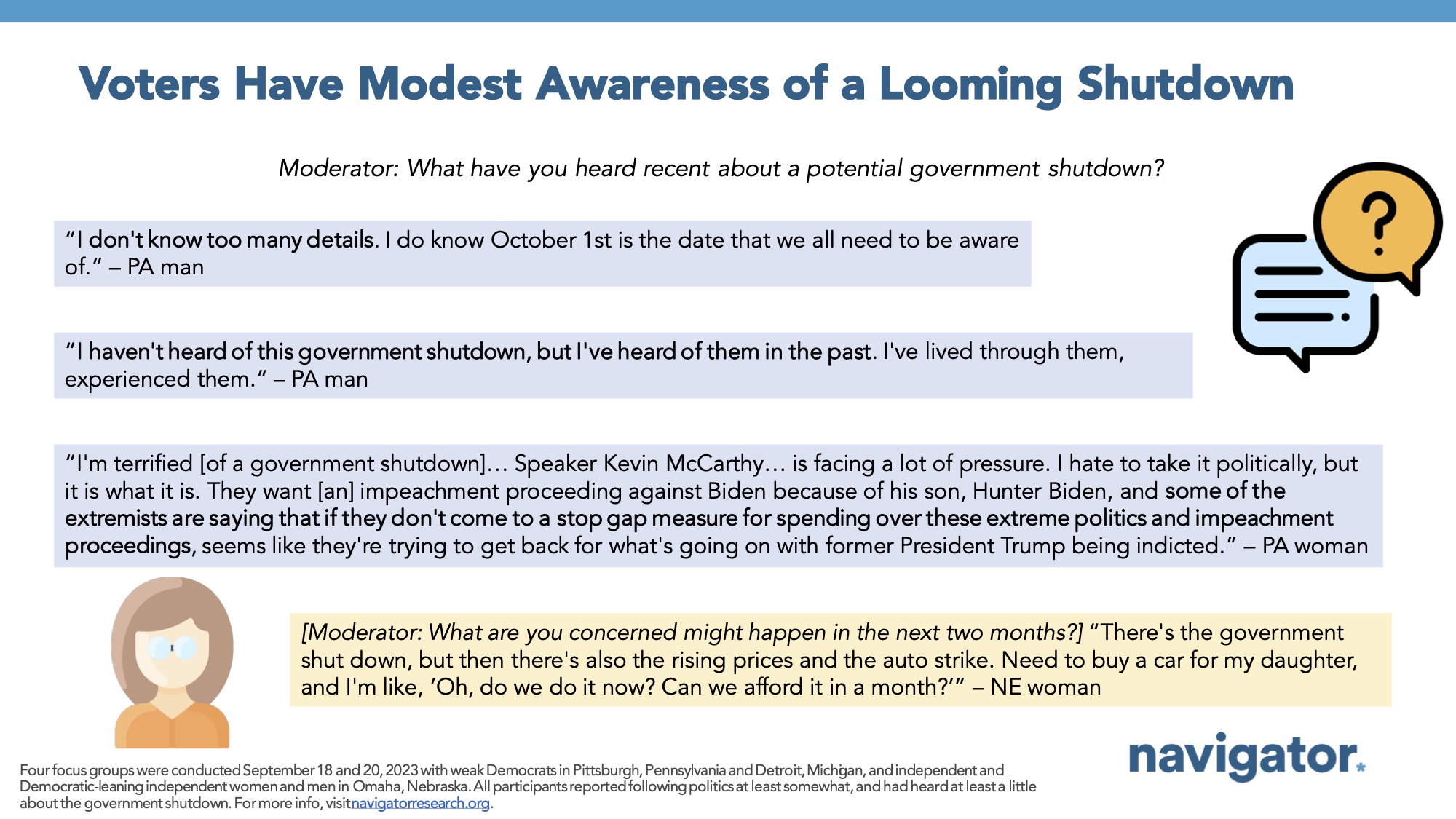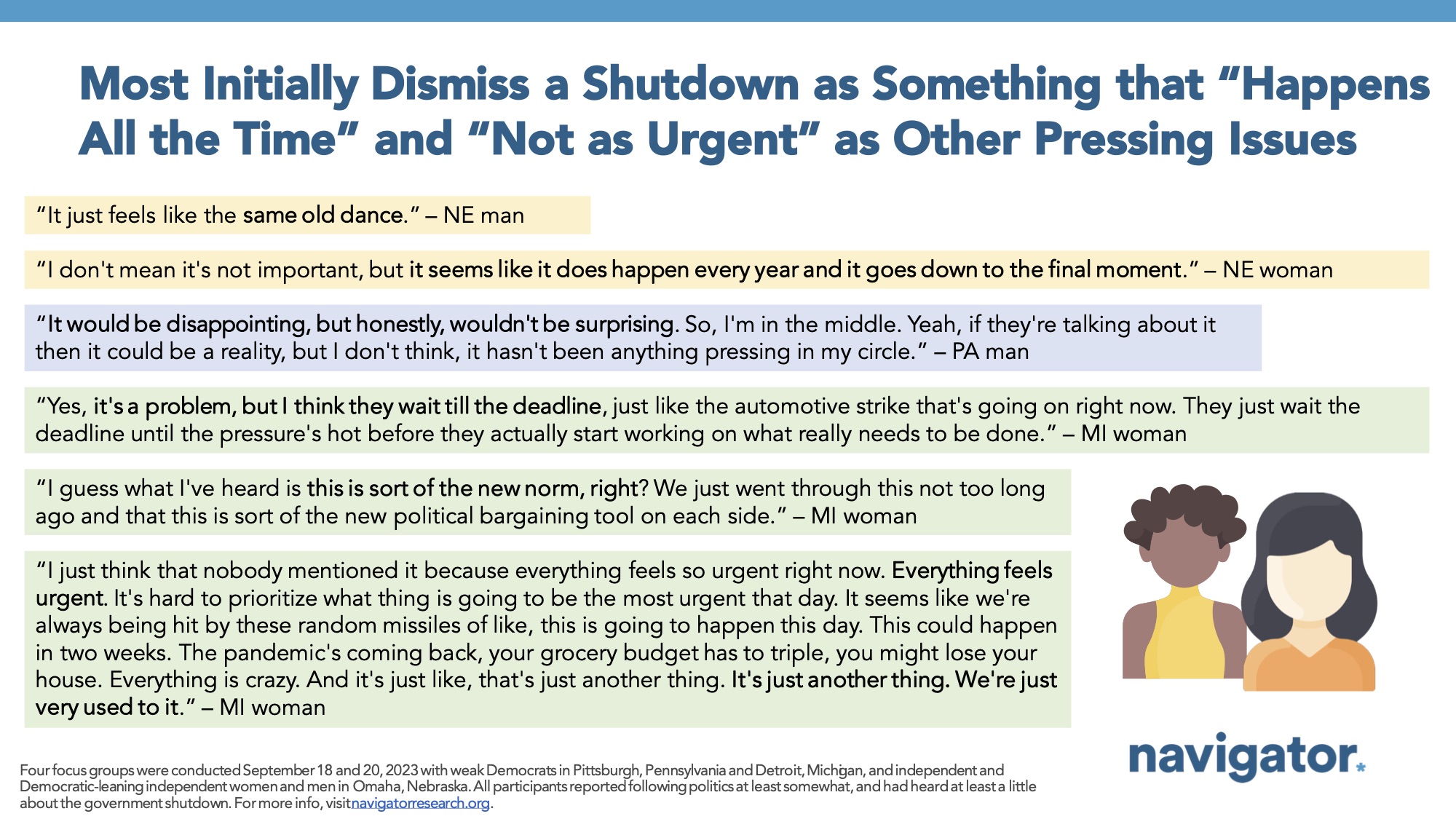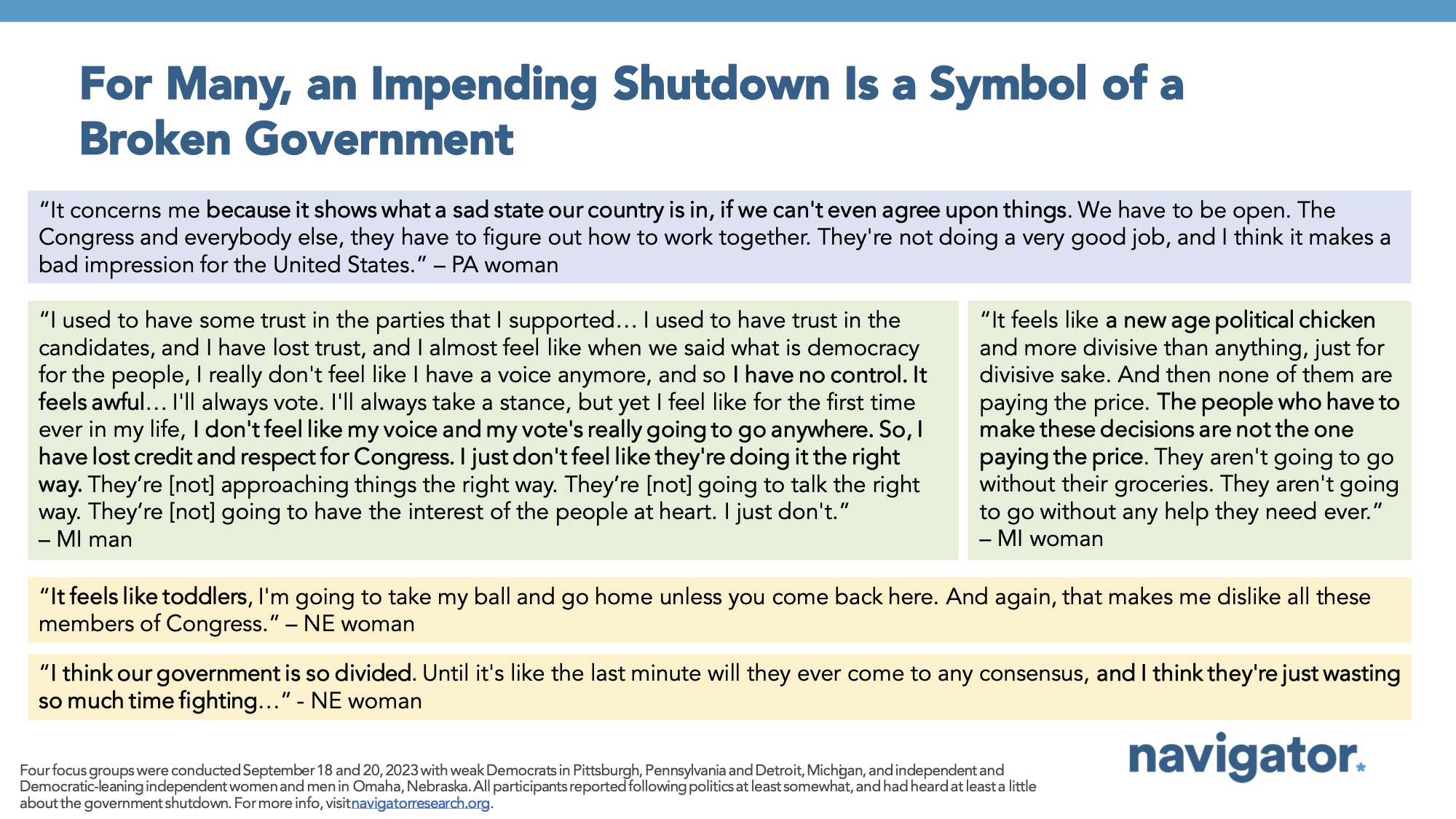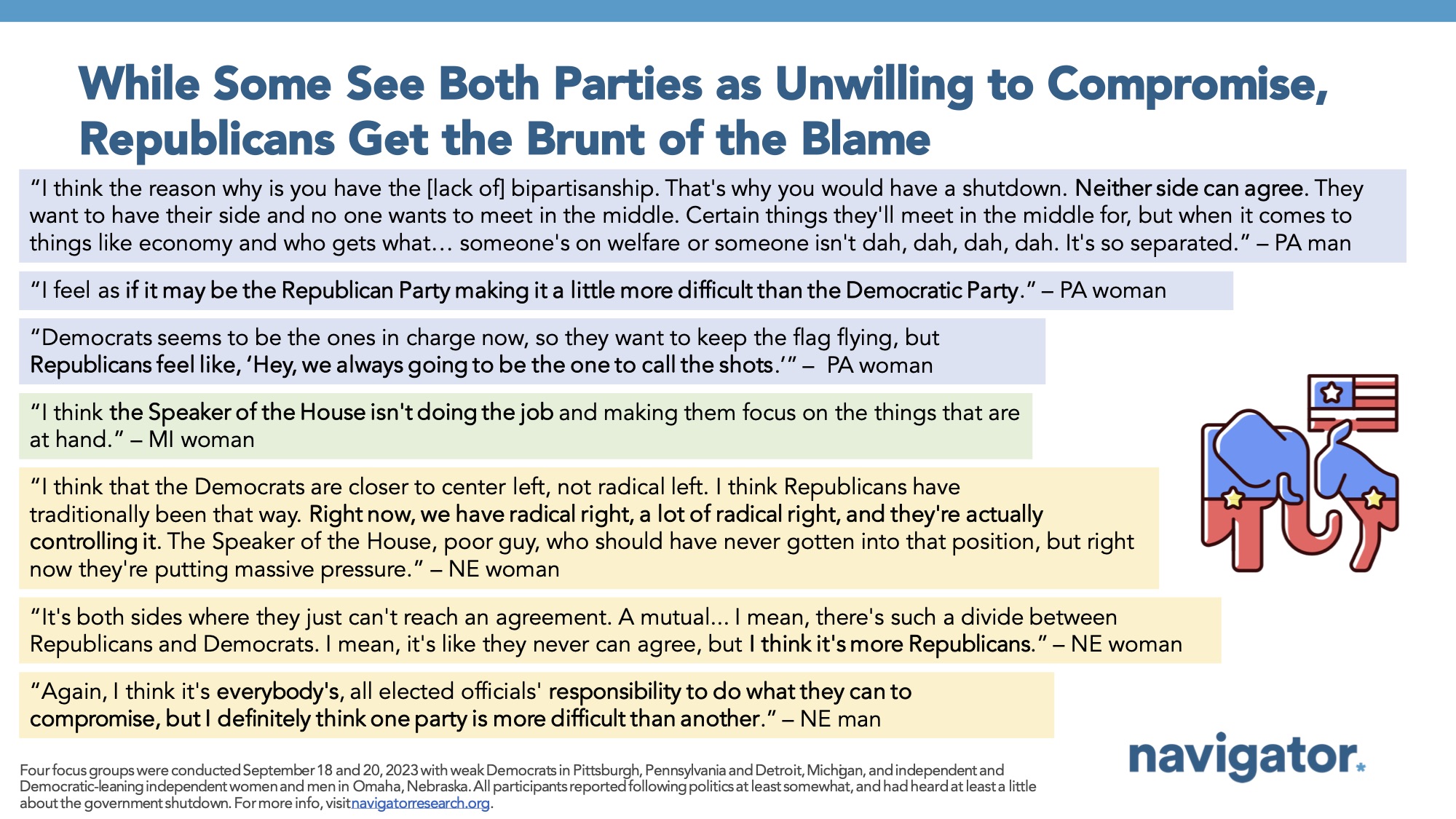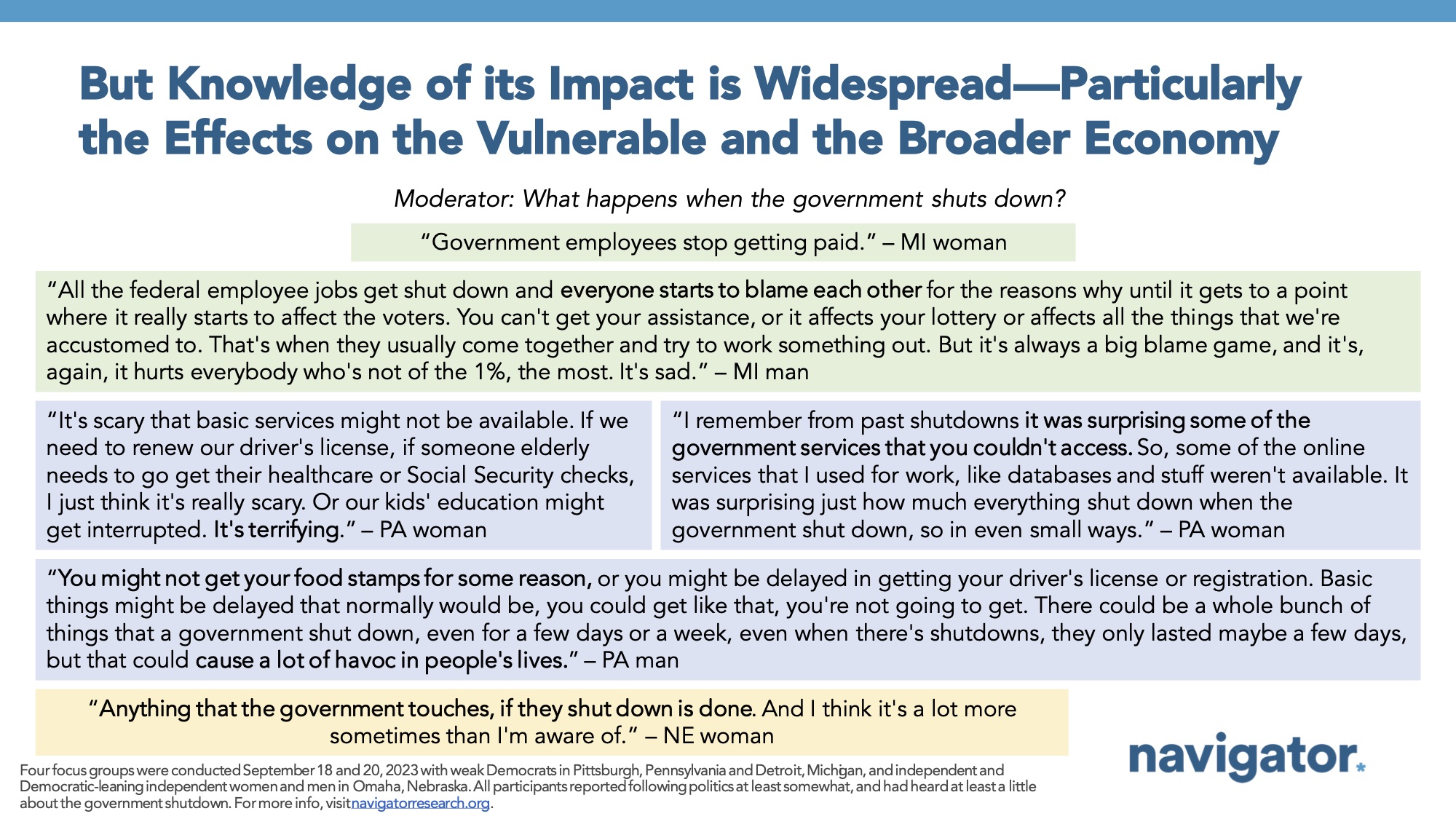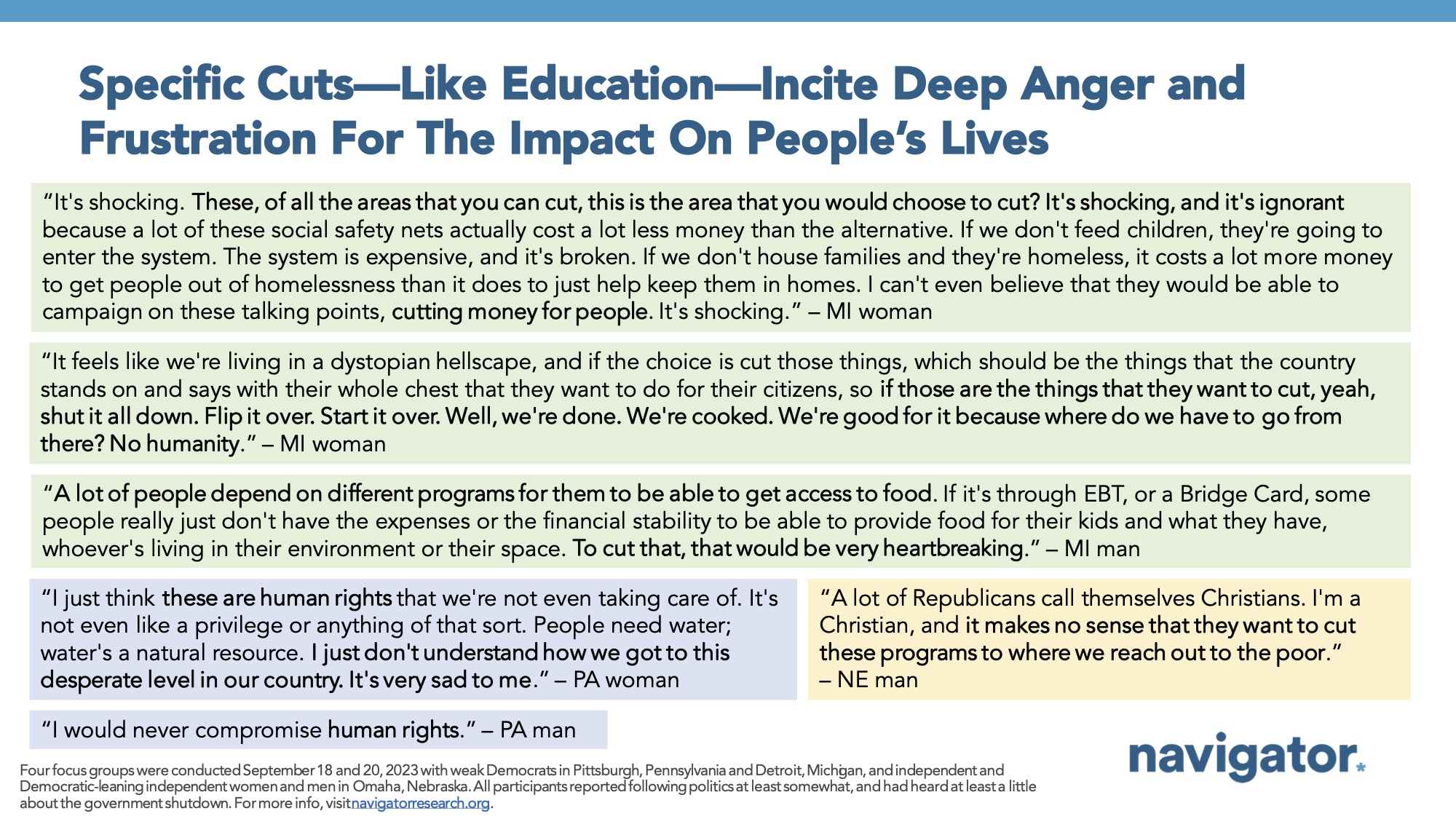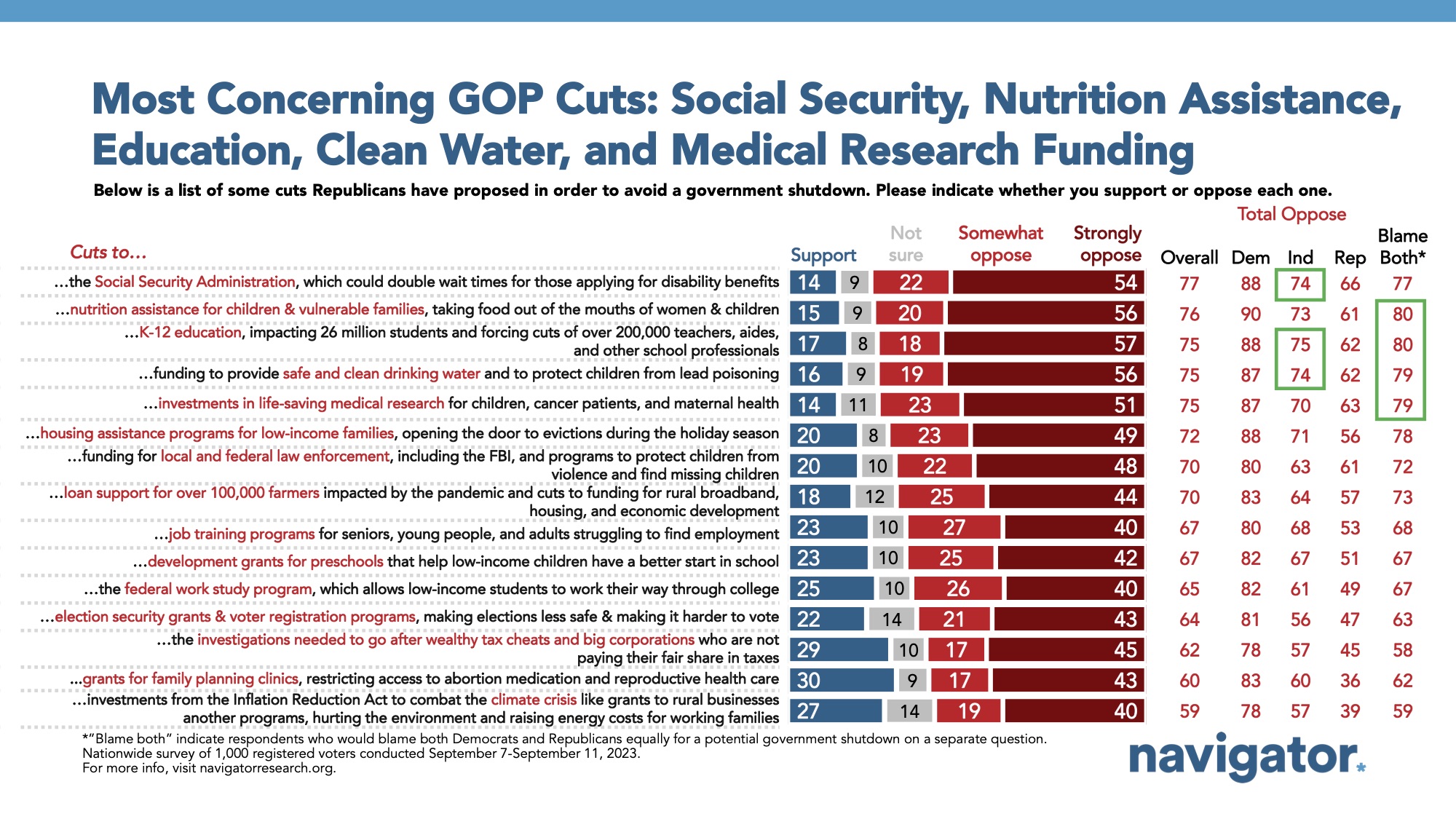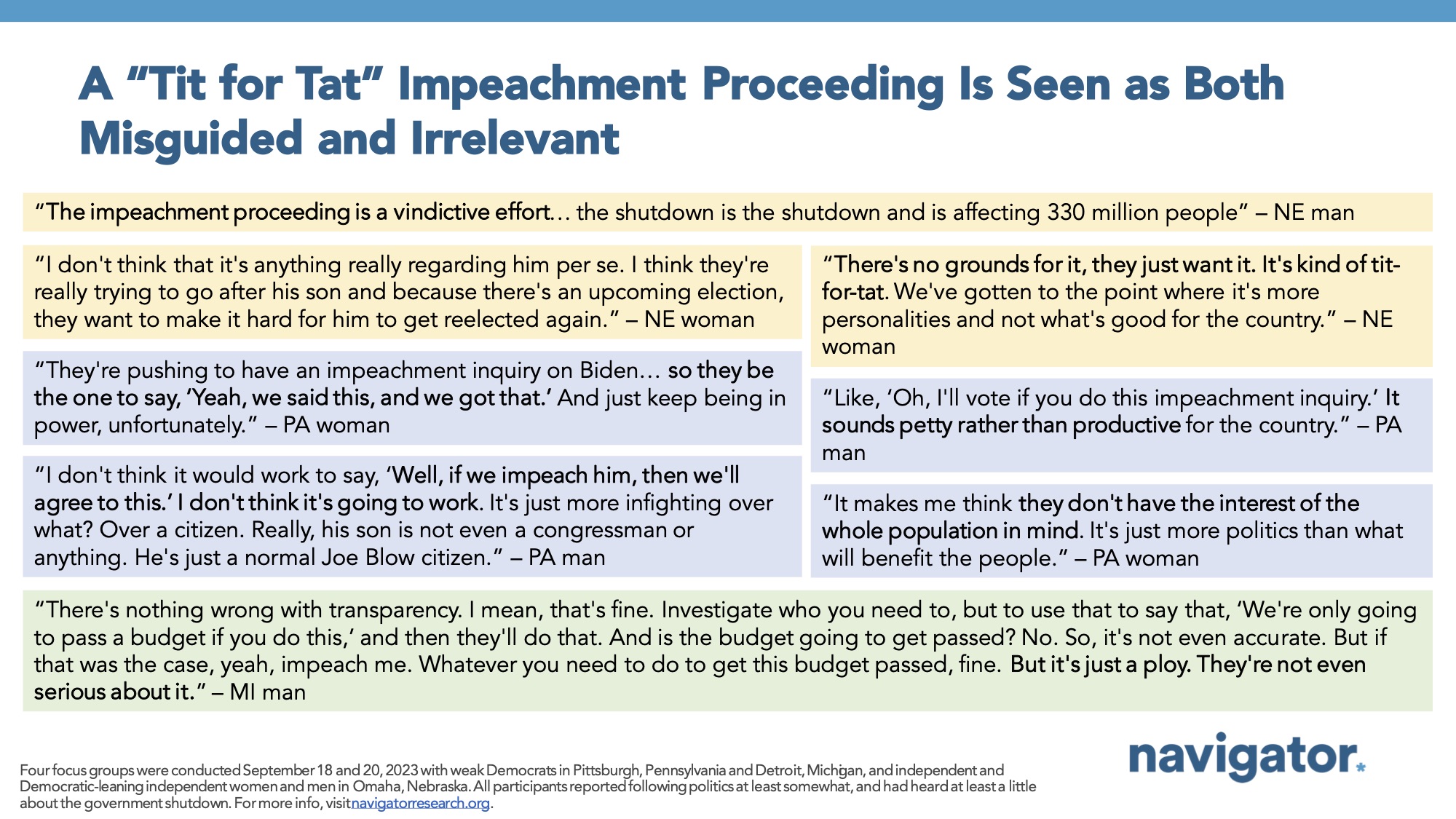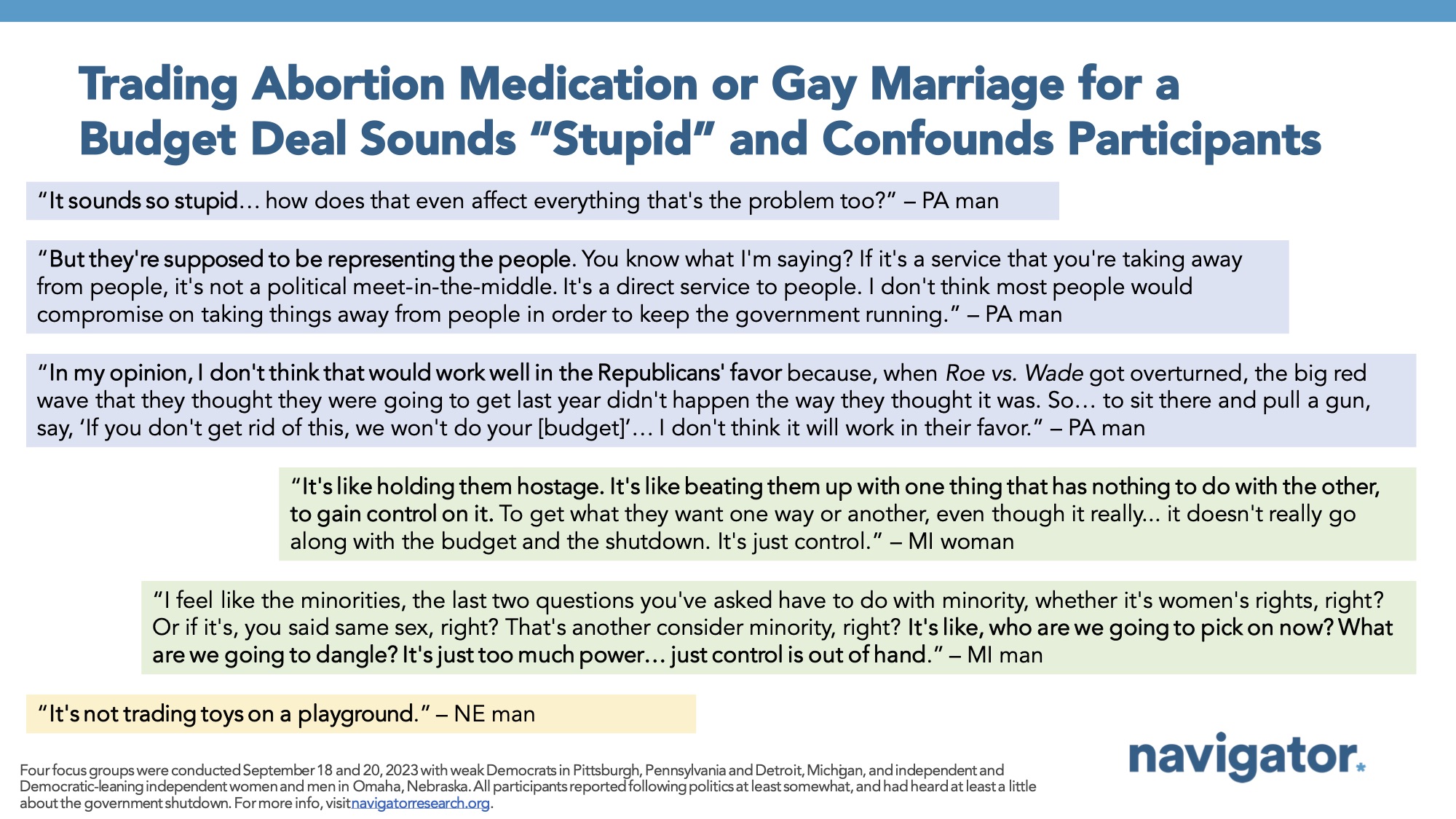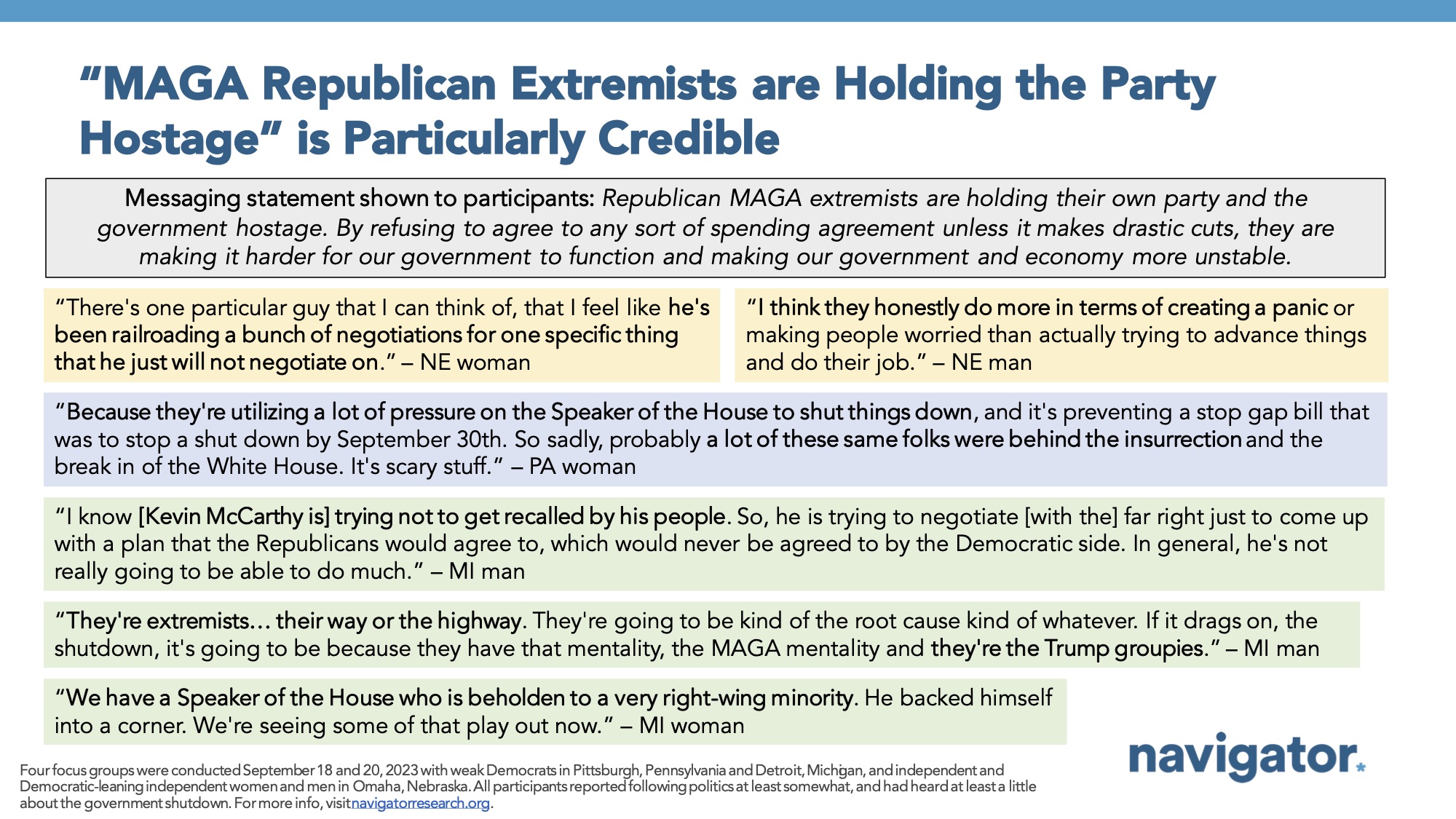Focus Group Report: Government Shutdown
This Navigator Research report contains focus group findings on the latest attitudes towards a looming government shutdown, including awareness and concern about a shutdown, how it might impact Americans and the broader economy, who they would blame if the government were to shut down, and reaction to various proposed spending cuts. We have also included in today’s release a new memo summarizing some of the key findings and guiding principles for progressives when communicating about a government shutdown and future legislative debates over spending priorities.
Awareness of a government shutdown is mixed and many perceive it as a symbol of broken government
Amid a looming government shutdown, Democrats in Pennsylvania and Michigan and independents in Nebraska express mixed levels of awareness and concern. Top concerns about what is going on in the country vary, with many citing economic concerns like a recession, housing prices, and inflation, while others worry about a resurgence of coronavirus and the implications that may have. Universally, participants felt the economy was not working for regular people, just for those at the top. As a Nebraska independent put it: “Everything’s getting more expensive, so it just kind of seems like people who are making the money are making really good money.” When asked what participants have been hearing out of Washington, D.C., several cited a potential impeachment of President Biden, Lauren Boebert’s behavior at a musical in Denver, and for fewer, a possible government shutdown. On the prospect of a government shutdown, a Pennsylvania Democrat noted: “I don’t know too many details. I do know October 1st is the date that we all need to be aware of.”
- Participants initially dismissed a government shutdown as something that “happens all the time.” One Michigan Democrat stated: “I guess what I’ve heard is this is sort of the new norm, right? We just went through this not too long ago and that this is sort of the new political bargaining tool on each side.” Participants brought up past shutdowns, including one Pennsylvania Democrat who said: “I remember from past shutdowns, it was surprising some of the government services that you couldn’t access… so some of the online services that I used for work, like databases and stuff weren’t available… it was surprising just how much everything shut down when the government shut down, so in even small ways.”
- For many, the shutdown is a symbol of broken government where neither party is seen as willing to compromise, but several lay more of the blame with Republicans. As a Nebraska independent put it: “They obviously can’t come to an agreement. So it’s not just a single party… everyone has to kind of come to somewhat of an agreement.” A Pennsylvania Democrat similarly stated: “Neither side can agree… they want to have their side and no one wants to meet in the middle.” For those who felt Republicans would be more responsible, one Michigan Democrat said: “I think the Speaker of the House isn’t doing the job and making them focus on the things that are at hand.” An independent woman in Nebraska agreed: “It’s both sides where they just can’t reach an agreement… I mean, there’s such a divide between Republicans and Democrats. I mean, it’s like they never can agree, but I think it’s more Republicans [who are to blame].”
Participants worry about a shutdown’s impact on vulnerable communities and the broader economy.
When asked what would happen if the government were to shut down, some cited a pause or delay on government services, including one Michigan Democrat who said: “I think that it impacts government services and the people that work for the government, they’ll be out of work… I think people that receive benefits from the government won’t receive their benefits… I know the national parks won’t get the things that they need, so it’s a lot that could happen if they do go on shut down.” A Nebraska independent also said: “I think it has potential to have a huge impact on… especially people who, if they’re receiving help from the government… the government is helping out schools, they’re not going to get that, the postal service, all of those… anything that the government touches, if they shut down is done, and I think it’s a lot more sometimes than I’m aware of.”
- Others noted the downward effects a government shutdown would have on the economy, including a Pennsylvania Democrat who stated: “It impacts me indirectly, but it’s the idea that in a tight housing market in a tight inflation and economy, people may become homeless because of this… and people lose their paychecks, they lose their ability to find a place to live… there’s already a huge, at least in my state, shortage of affordable housing, and then it’s harder to apply for help… to get food stamps… I am worried that it’s going to affect people’s ability to pay their mortgage or get food.” A Nebraska independent also noted: “The government stimulates the economy through pay and through job support and stuff like that… those things are gone… that’s where trickle-down economics really works, not the other way.”
- In a Navigator survey from earlier this month, 77 percent of Americans stated they believe a government shutdown this fall would hurt the economy, including a plurality who say it would hurt the economy “a lot” (45 percent).
While both parties are largely seen as unwilling to compromise, Republicans are seen as being somewhat more responsible.
Participants were most opposed to Republican-proposed spending cuts to programs in order to keep the government funded, specifically related to Social Security, nutrition assistance, education, and clean water. When given a list of spending cuts Republicans had proposed, participants expressed anger and frustration, with one Michigan Democrat stating: “It’s shocking, and it’s ignorant because a lot of these social safety nets actually cost a lot less money than the alternative… if we don’t feed children, they’re going to enter the system, [which] is expensive, and it’s broken… if we don’t house families and they’re homeless, it costs a lot more money to get people out of homelessness than it does to just help keep them in homes.” Cuts to education were particularly appalling, with one Pennsylvania Democrat saying: “I just think [education is] really important… I think that if anything, we should fund education more in this country, so I couldn’t see any cuts to that… I definitely wouldn’t cut education.” Similarly, an independent from Nebraska said: “Our children’s education is… the biggest foundation of our country… it’s what brings our leaders, brings our innovators… it’s stupid to cut that.”
- Our survey from earlier this month also found that three in four Americans were concerned about “cuts to K-12 education, impacting 26 million students and forcing cuts of over 200,000 teachers, aides, and other school professionals” (net -58; 17 percent support – 75 percent oppose), while other Republican-proposed cuts were also deeply unpopular, especially those aimed at Social Security (net -63; 14 percent support – 77 percent oppose), nutrition assistance (net -61; 15 percent support – 76 percent oppose), medical research funding (net -61; 14 percent support – 75 percent oppose), and funding to provide safe and clean drinking water (net -59; 16 percent support – 75 percent oppose).
Republican negotiations that include threats of impeachment, curbing access to abortion, and finishing building a border wall are seen as “tit for tat” and “stupid.”
When asked about various proposals by Republicans to avoid a shutdown, many participants were perplexed and found each of them disconnected to the issue of funding the government. Specifically on impeachment, a Nebraska independent said that “it’s like a waste of time,” while a Pennsylvania Democrat noted that “it sounds petty rather than productive for the country.” When it came to compromising abortion medication by mail, a Pennsylvania Democrat said: “It sounds so stupid… how does that even affect everything that’s the problem too?” A Nebraska independent said: “Why does anything have to be added onto the simple problem of creating a budget to run our government? Why do they need to keep adding on riders in some way, shape, or form?”
- Messaging related to MAGA extremists holding their party and the government hostage was credible to these participants. One Michigan Democrat stated: “They’re extremists… their way or the highway… they’re going to be kind of the root cause if it drags on, the shutdown, it’s going to be because they have that mentality, the MAGA mentality and they’re the Trump groupies.” A Nebraska independent stated: “They’re just very close-minded people… they can’t even agree with their own party as far as Republicans, so that’s just kind of insane.” Another Nebraska independent said: “It’s just scary that there’s people like that that have that much control.” A Pennsylvania Democrat similarly said: “They’ve been screaming the loudest for six-plus years now, and they’re not willing to negotiate… they have these talking points that they have to hit, and there’s no negotiation… it is a personality trait… not governance, and you can’t negotiate with that.”
